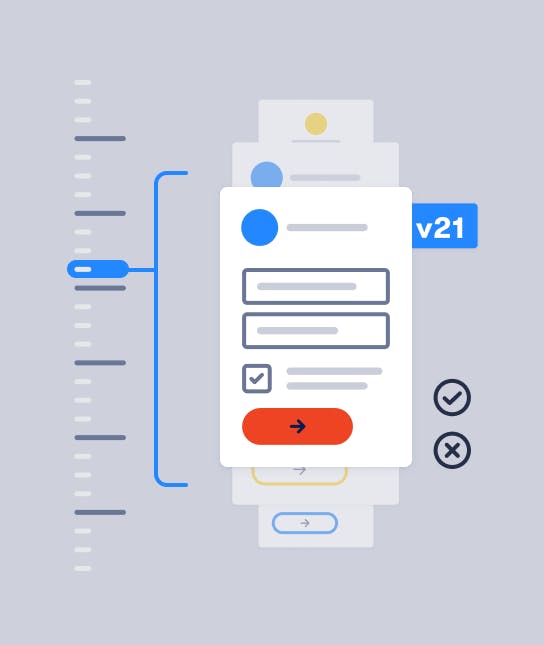Formsort for engineers
Is your engineering time wasted on trivial form changes? Formsort allows non-developers to create and manage forms. While business users handle content and design, engineers can leverage Formsort’s power features to enhance the forms.
With streamlined workflows, you'll spend less time back-and-forth on minor alterations. We help take care of things like returning responder behavior, capturing partial answers, and sending data to your database.
Enable changes, safely
Safely test the same flow with different integration settings (environments), use versioning for efficient management, and leverage the Admin API for programmatically query forms, variants, deployments, and JSON schema. Use form schema to define a set of questions required for publishing a form to ensure that your teammates can make edits safely.

Smart by design
Make your forms dynamic with complex logic, calculated variables (define new answers based on inputs with JavaScript functions), and API variables (fetch answers from external sources). Seamlessly reuse content across forms using the content library, ensuring efficiency and consistency throughout your form-building process.

Integrate into your stack
Connect your database and analytics infrastructure and add in best-in-class point solutions, without having to maintain a custom form codebase. Formsort queues, sends, and purges responder answer data to ensure reliable delivery and minimize vulnerabilities. Use Formsort’s custom question capabilities for functionalities not supported out of the box.

How can Formsort help you create forms?
Forms with advanced logic
Leverage a range of logic options, from basic conditions that show or hide questions based on user inputs to more complex logic using MongoDB query operators. For advanced needs, you can use TypeScript functions to create calculated variables or use external data via API calls, allowing you to build highly dynamic and responsive forms.
Seamless API and webhook integrations
Fetch data in real-time or push completed and partially completed forms to your data stores. Formsort’s integrations streamline the process, saving your team valuable development time and ensuring that your data is always up-to-date and securely managed.
Automated workflows for faster deployments
Formsort’s engineering-friendly form builder include programmatic access to forms, variants, and deployments via API. You can automate testing in staging environments and push updates to production with minimal manual intervention.
Enhanced customization capabilities
Tailor your forms exactly to your needs with custom validation, custom CSS, and custom questions —validate inputs with specific rules, style every element to match your brand, and create unique questions that go beyond standard options.
Capture events and answers
Formsort lets you embed the form within your website, and capture events and answers emitted by the form.
Try adding your answer in the form and see the answers payload updates in realtime!
Frequently asked questions
Yes, Formsort is scalable, secure, and flexible. Check out our relevant enterprise features.
You can either embed your form within an existing page or we can host is for you. See this article for more details.
Currently you have three options: using URL parameters, reading from cookies, and POSTing from another form. See our article describing each of these methods.
Formsort offers a huge number of question types. But if for some reason you cannot find what you are looking for, you can always use a custom question. See more on this here.
Yes! If you want to manage your forms programmatically, you can use our Admin API. This API lets you query for forms, variants, deployments, and JSON schema. You can promote your forms between environments for automated testing in a staging environment before it's deployed to production.




